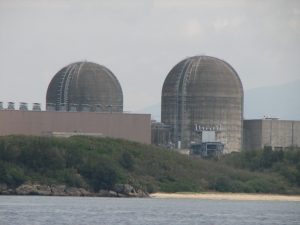Taiwan’s next president, Lai Ching-te of the incumbent Democratic Progressive Party (DPP), is planning to decommission all nuclear power plants by 2025. Taiwan is one of the most energy-insecure economies in the developed world and cannot afford to retire nuclear power without undermining its national security interests and climate goals.
Under current President Tsai Ing-wen, Taiwan decommissioned two of its three nuclear power plants, straining a power grid that has already experienced three major blackouts since 2017. Taiwan’s last operational nuclear power station will retire next summer. President-elect Lai therefore urgently needs to create a plan to secure Taiwan’s energy future.
Nuclear energy has long been fundamental to Taiwan’s energy infrastructure, but its future has become precarious amid political backlash. The DPP has consistently opposed nuclear energy since aligning with anti-nuclear environmental groups. Chen Shui-bian, the first DPP president, pledged to eliminate nuclear power in Taiwan by 2025 under the “nuclear-free homeland” policy.
The 2011 Fukushima disaster in Japan bolstered support for the DPP’s anti-nuclear stance, inciting mass anti-nuclear protests that led the government (then under the Kuomintang, or KMT) to halt the construction of the controversial No 4. nuclear plant. However, after recent widespread power outages caused millions of U.S. dollars in losses, support for keeping nuclear energy capacity in Taiwan grew.
In 2018, 60 percent of 10 million voters rejected a proposition to completely phase out nuclear power in a referendum, but 4 million voters rejected another referendum in 2021 on finishing the construction of the No. 4 nuclear power plant.
During the 2024 presidential race, Taiwan’s main opposition parties campaigned to restart operations on Taiwan’s decommissioned nuclear power plants. Even Lai signaled he would consider leaving one reactor functioning for emergencies. However, to do this Lai would need to extend the operational license of Taiwan’s last remaining power plant, even though the deadline for renewal passed several years ago.
While straying from the DPP’s anti-nuclear policies will alienate Lai’s supporters, phasing out nuclear energy also has political consequences. A nuclear phase-out will severely undermine Taiwan’s energy security at a time of increased geopolitical tension. Taiwan imported 97 percent of its energy in 2022. The Tsai administration’s strategy of replacing coal and nuclear power with natural gas leaves electricity generation vulnerable to disruption. Beijing can strangle the island through a naval blockade without resorting to a full invasion. Taiwan has few LNG terminals and its gas stockpile would last for only 11 days. By comparison, nuclear power plants can continuously operate for up to 18 months without refueling.
Opponents argue earthquakes can lead to accidents, plants can be targeted during conflicts, and there is no permanent waste storage solution. These concerns are overstated. Robust safety functions allow nuclear facilities to withstand significant seismic activities. During Taiwan’s deadly 1999 earthquake, all reactors safely shut down and restarted two days later. Similarly, Beijing is unlikely to strike nuclear power plants in the event of war given the risks of pollution and damage to its global image. Countries such as Finland and Sweden are now building permanent storage facilities for spent fuel and nuclear waste.
Separately, Taiwan will be susceptible to energy shortages if it completely phases out nuclear energy. Nuclear energy can help solve Taiwan’s power crunch as it can supply abundant and cheap electricity to Taiwan’s power-hungry high-tech manufacturers. The average cost of nuclear power was NT$1.41 per kilowatt-hour in 2023. This is lower than both renewable (NT$2.27) and fossil fuel (NT$3.57) energy sources.
Lastly, eliminating nuclear power risks jeopardizing Taiwan’s transition to carbon neutrality. The government is falling behind its target of expanding renewables to 20 percent of energy production by 2025. With less life-cycle emissions than solar, nuclear power can complement renewables in decarbonizing energy production. Since renewable sources are intermittent, nuclear is ideal in providing baseload – the minimal level of power that needs to be supplied to an electrical grid.
Lai’s fresh mandate allows him to renew the national dialogue on nuclear energy. The global energy crisis and climate emergency prompted 22 countries, including the United States, United Kingdom, and France to commit to triple their nuclear energy capacity by 2050 during COP28. Even neighboring South Korea and Japan have reversed their post-Fukushima policy of phasing out nuclear power. Ideally, the Lai administration should complete Taiwan’s mothballed No. 4 nuclear power plant, which can meet more than 5 percent of Taiwan’s electricity needs, in addition to extending the service lifetime of existing nuclear fleets after inspection and repair.
If political opposition proves insurmountable, Lai should at least preserve Taiwan’s nuclear expertise. The industrial competence, safety measures, and regulatory frameworks that support nuclear energy would take years to reestablish if lost. Technological breakthroughs, such as small modular reactors, can make new power plants less expensive, and easier to construct. Preserving its nuclear expertise will allow Taiwan to deploy new technologies once they mature.

































